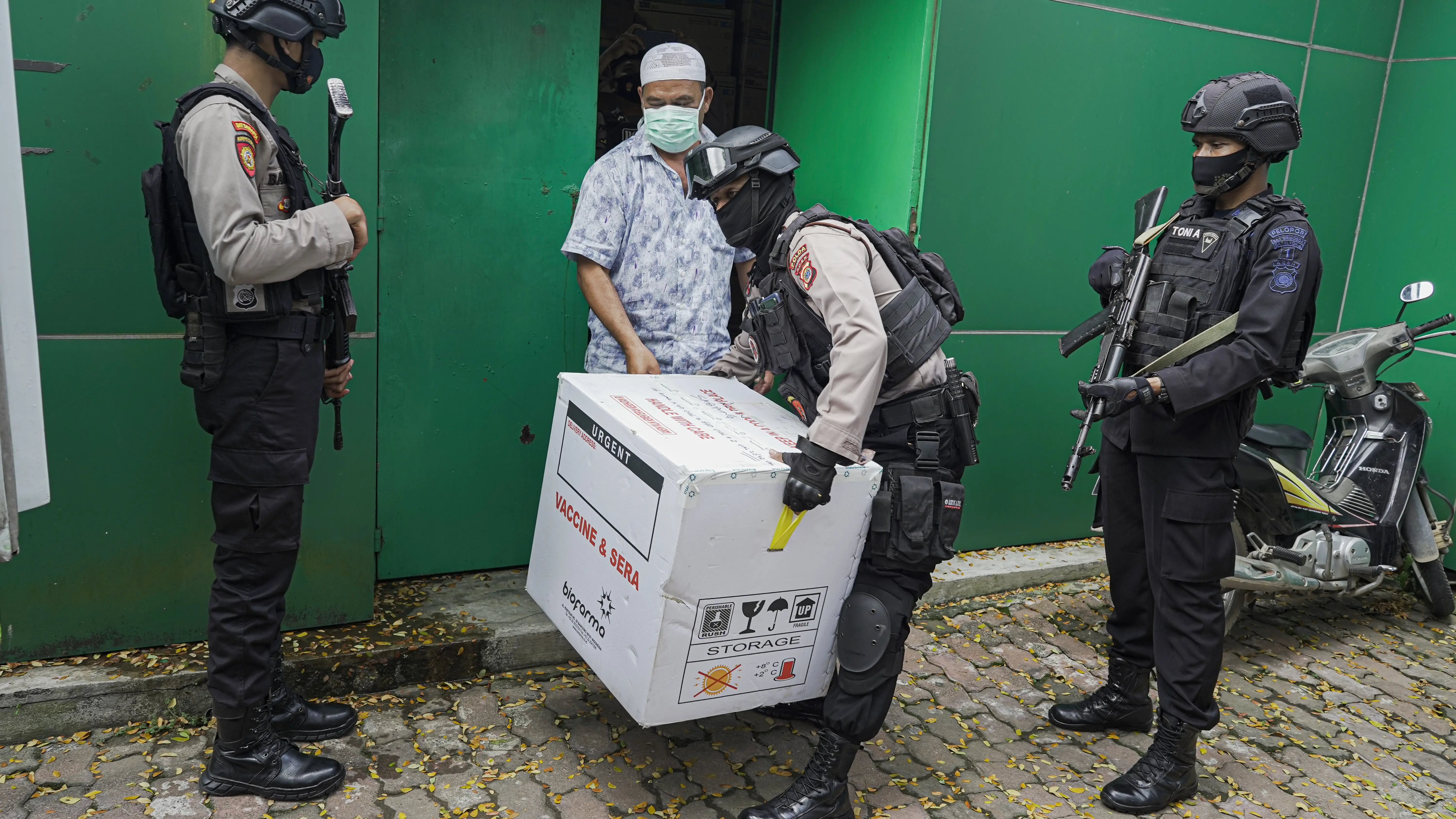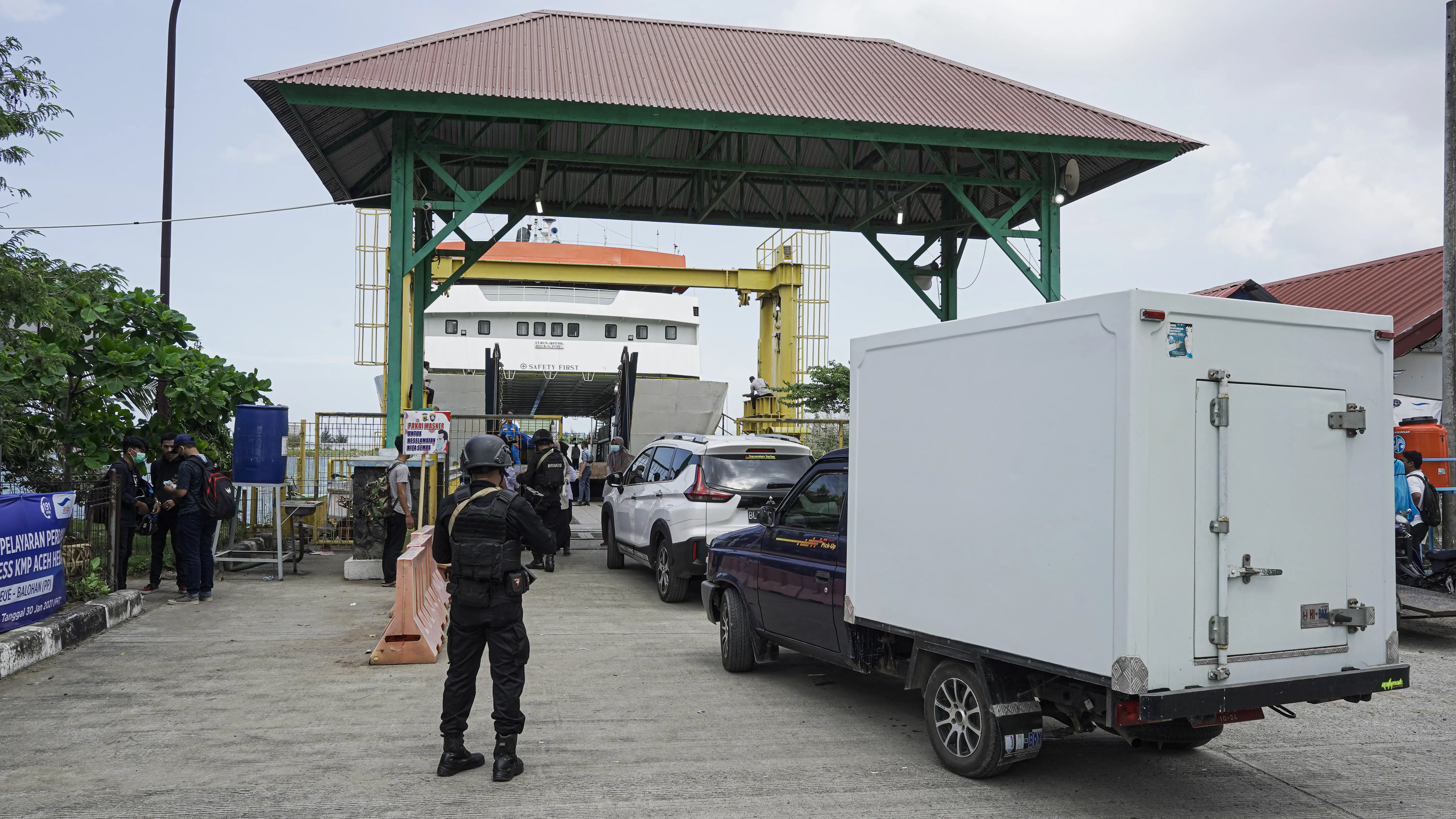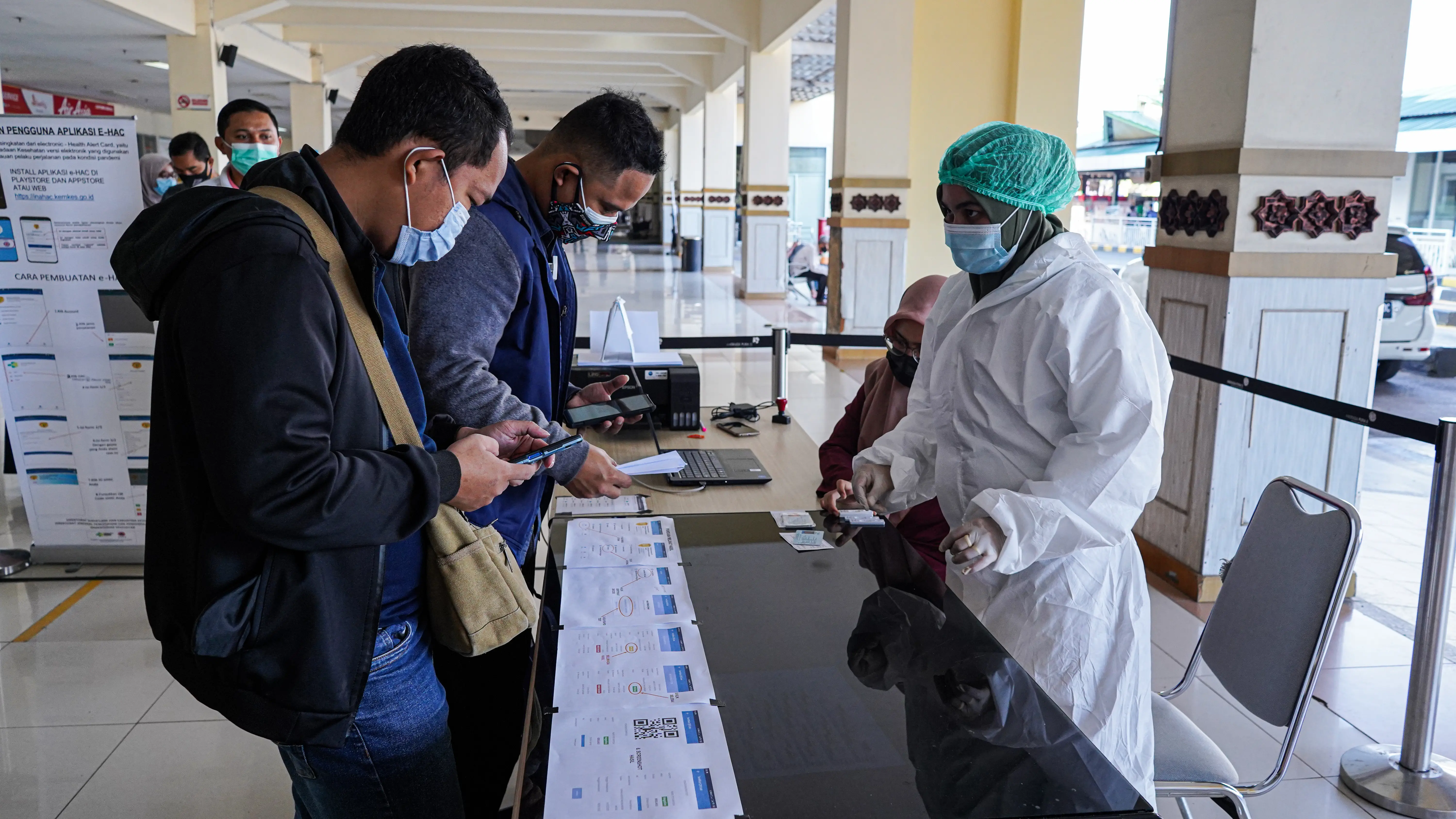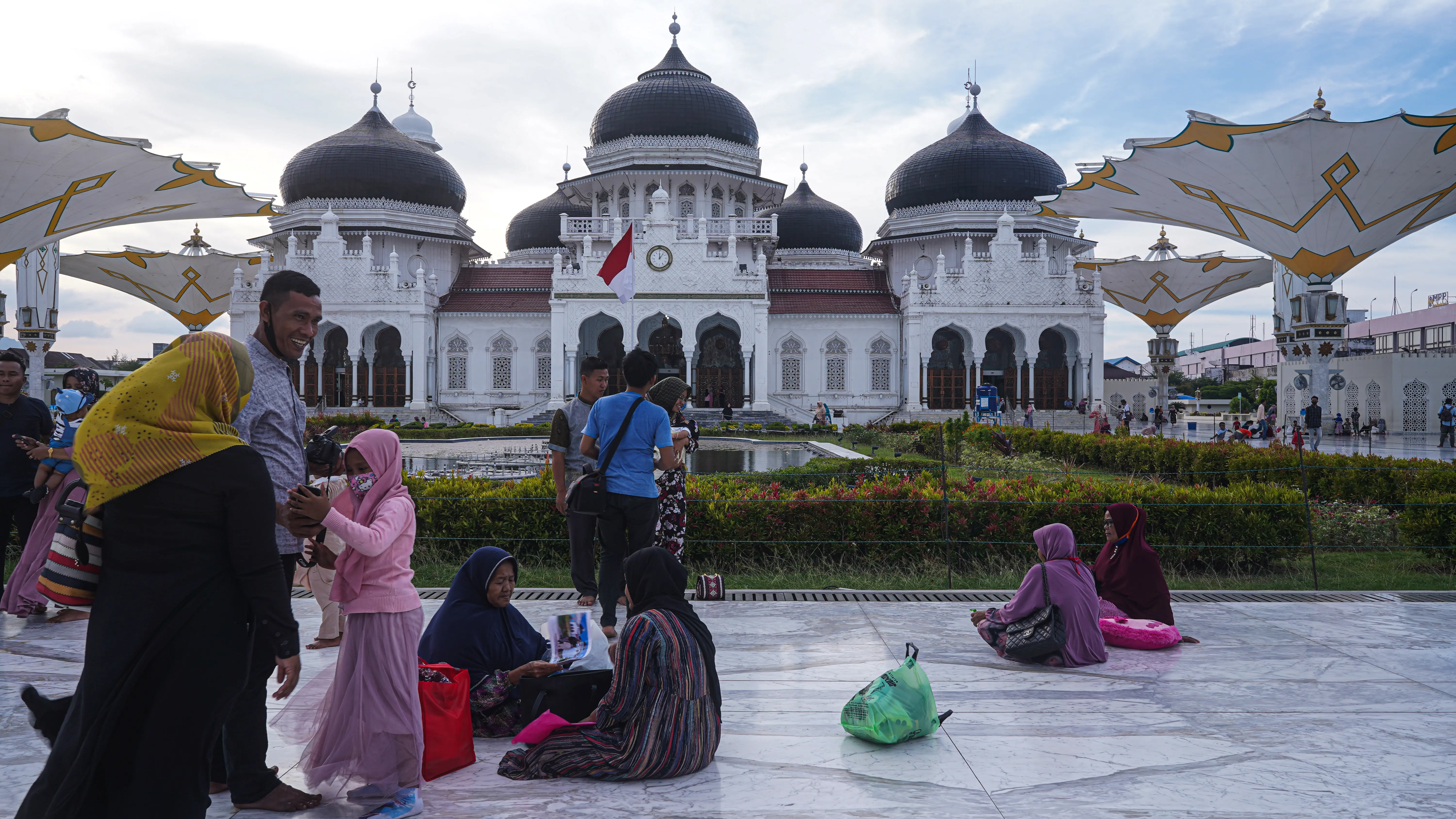
The health officials were racing against the clock. Doses of the coronavirus vaccine had to reach Sabang, a city on the mountainous Weh Island in the Andaman Sea, by that afternoon. It was early February, and Indonesia was falling behind on its plan to vaccinate health workers, a crucial step in one of the world's most ambitious immunization campaigns.
The vaccines, made by China’s Sinovac Biotech, traveled three hours by plane from Jakarta to Banda Aceh but had four hours to go via ferry and armored truck to reach the distribution center.
“It’s pretty much a last-minute effort,” said Iman Murahman, a spokesman for the Aceh Health Agency. “But I hope we can still be on time.”
Coronavirus vaccines offered hope that the world was at the beginning of the end of a pandemic that has taken millions of lives and livelihoods. Indonesia, which has recorded 1.5 million cases and 40,000 deaths, pivoted in recent months from containment to inoculation, betting that vaccines could help reopen the economy, relieve hospitals and protect people across the vast archipelago.
But the first phase of the Sinovac drive in Aceh, the westernmost province of 5 million, has been derailed by misinformation, mistrust and geographical and practical constraints. Aceh and its poor infrastructure have been stretched thin, even with creative solutions such as retrofitting fishery trucks into cold-storage vehicles capable of distributing vaccine doses.
“We need at least 2 million doses per day [across Indonesia] if we want to finish the vaccination drive by next year,” said Dicky Budiman, an epidemiologist at Griffith University in Australia, many times the current rate of 400,000 a day.
Slow vaccination pace

In January, Indonesia began rolling out its plan to vaccinate 180 million of its 270 million people, after a late-stage Sinovac trial of 1,600 people in the country showed an efficacy rate of 65.3 percent. The full data has not been published in a peer-reviewed journal or made public by Sinovac, usually a prerequisite for regulatory approval. A Brazilian trial of more than 12,000 health-care volunteers revealed an efficacy rate of just 50.4 percent.
Indonesia has secured commitments for about 330 million vaccines, including 125.5 million doses of Sinovac’s CoronaVac, 50 million doses each from Oxford-AstraZeneca and Pfizer-BioNTech, 50 million from Novavax and 54 million doses from the World Health Organization. Only CoronaVac has been distributed so far, with health workers, civil servants and senior citizens first in line.
But at the current pace, it would take Indonesia 10 years to reach its goal. Health Minister Budi Gunadi Sadikin said officials should be administering 1 million doses a day but did not elaborate on the capacity to expand the program.
In late February, officials hoping to accelerate the rollout authorized private companies to buy state-procured vaccine doses to offer to employees and their families. Some criticized the move as widening inequality and disrupting access for those who need it most.
“Cooperation between private [companies] and the government is a good move if we want to speed up the vaccination,” Pandu Riono, an epidemiologist at the University of Indonesia, said. “But we should focus on the vulnerable and priority groups first.”
Overshadowed by skepticism

Indonesia has also struggled to convince its people to get the shots. A survey by local pollster Saiful Mujani Research and Consulting in December found 23 percent of respondents believed the vaccines were unsafe. Another survey of 1,200 respondents by research center Indikator Politik Indonesia in February found 55 percent would refuse the coronavirus vaccine.
Public skepticism was evident when the Sinovac doses finally made it to Sabang, guarded by a motorcade of police tactical vehicles and men with AK-47s. What was so precious, residents wondered, that it had to be guarded this way?
“As if we would steal the vaccines,” said Abdullah, 59, who runs a kiosk selling cigarettes and other small items. Abdullah, who like many Indonesians goes by one name, does not plan to get vaccinated.
Fitriliani, a 26-year-old restaurant owner who also goes by one name, had no idea about the vaccination program.
“I think there’s no virus here,” she said. “So why do we need vaccination then?”
A survey by the WHO, UNICEF, Indonesia’s Health Ministry and the Indonesian Technical Advisory Group on Immunization in September involving more than 100,000 respondents in all 34 provinces found that Aceh had the lowest acceptance rate, at 46 percent.
To assuage doubters, Indonesia’s highest clerical body signed off on the vaccine as halal. But the move has had little impact in Aceh, a deeply religious and conservative region of this mostly Muslim country. Rather than social distancing, vaccines or lockdowns, many there said prayer would be the answer.
“We have been through a lot of outbreaks since the era of prophet Muhammad. There is no other cure except prayer and the grace of Allah,” said Zakaria, a 53-year-old merry-go-round operator in Banda Aceh who also uses one name.
The central government, meanwhile, moved to penalize those who refuse vaccinations by cutting social assistance or access to public services.
A health worker at the ICU at a hospital in Banda Aceh, who spoke on the condition of anonymity for fear of repercussions, said the government left no options for health workers who refused vaccination. “I don’t trust the CoronaVac vaccine, but do I have a choice?” she said.
She said she got the shot after Aceh Gov. Nova Iriansyah in February issued a memo, reviewed by The Washington Post, stipulating that health workers who refused vaccination could face termination.
Misinformation and mistrust

While authorities stress that vaccine side effects, such as fatigue and fever, are mostly mild and temporary, many people here worry about serious aftereffects, thanks to disinformation and vague official messaging.
Some have expressed particular concerns about CoronaVac, citing Sinovac’s lack of transparency.
For many in Aceh, there is simply no urgency. The province implemented lockdowns and curfew last April but reversed them after a week.
For many here, the coronavirus appears to be a distant memory. Public spaces remain open, and most people do not wear masks. Schools resumed early this year. Many believe simply exercising will help keep the virus away.
“I only trust something that is organic,” Putra Siregar, a 27-year-old artist, said. “Even if there is some kind of punishment from the government, I still won’t take the vaccine.”
Aribowo Sasmito, co-founder of the Indonesia Anti-Slander Society, a nonprofit myth-busting organization, said disinformation has played a role in stymieing the takeup. He said his organization had recorded 712 hoaxes about vaccines between January and November 2020, while the Ministry of Communication and Information documented more than 2,000 hoax topics related to the pandemic.
One anti-vaccine Facebook group, the Anti-Vaccine and Immunization Movement, has nearly 2,800 members and has been active since 2013. In the “About” section, site administrators cite passages from the Koran to justify their beliefs that God has provided humans with enough natural resources to fight off illnesses.
While the group is private, some posts can be viewed publicly. Many are filled with anti-vaccine memes and disinformation.
“We have good Internet penetration in some regions, but it wasn’t combined with critical thinking; what we see is a massive influx of hoaxes,” Sasmito said. “Good messaging is crucial at this moment.”
Shibani Mahtani in Hong Kong contributed to this report.
COVID-19 Update: The connection between local and global issues–the Pulitzer Center's long standing mantra–has, sadly, never been more evident. We are uniquely positioned to serve the journalists, news media organizations, schools, and universities we partner with by continuing to advance our core mission: enabling great journalism and education about underreported and systemic issues that resonate now–and continue to have relevance in times ahead. We believe that this is a moment for decisive action. Learn more about the steps we are taking.








